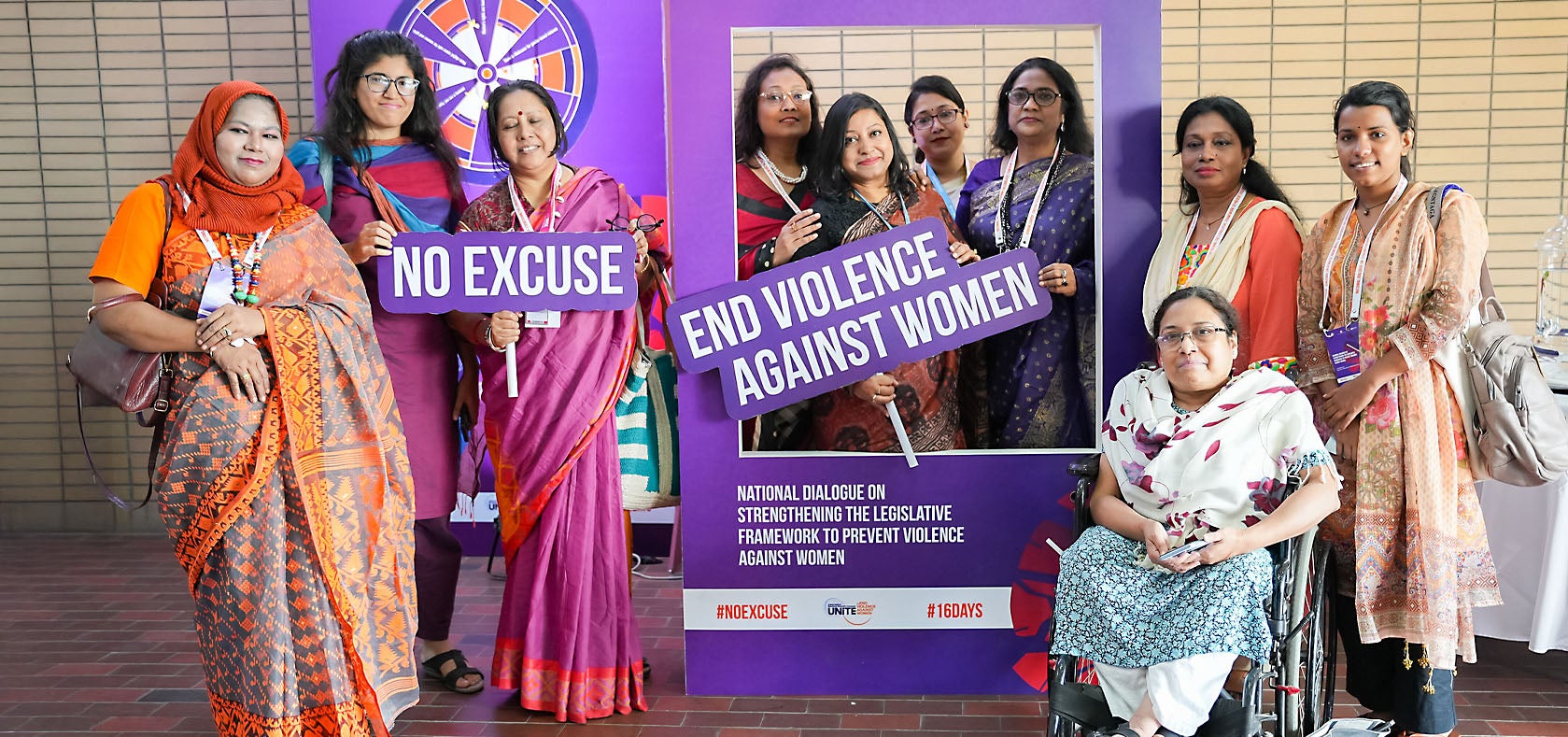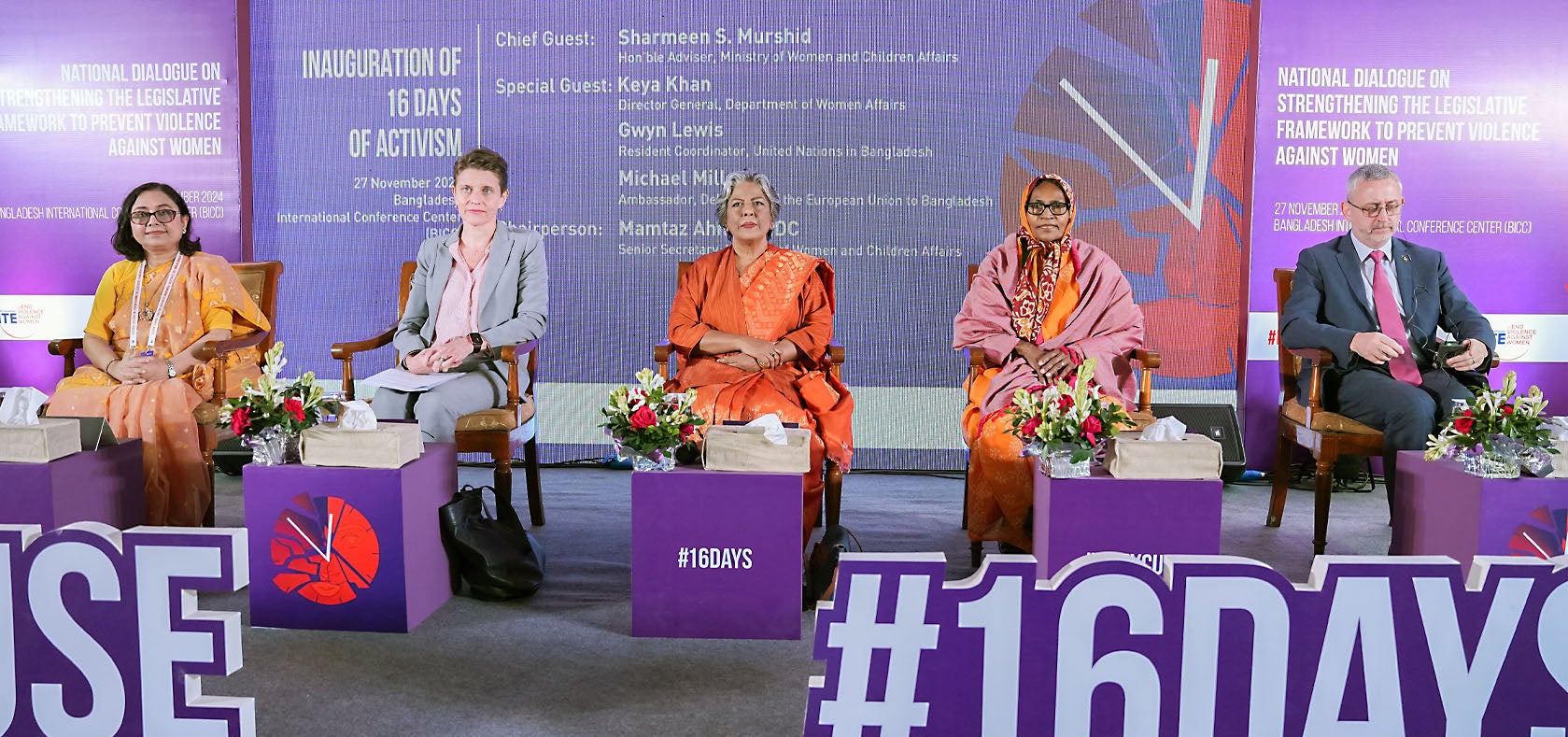National dialogue highlights key steps to strengthen laws to prevent violence against women and girls in Bangladesh
Date:
Author: Shararat Islam

In a country where nearly three-quarters (73 per cent) of women experience violence from intimate partners, a national dialogue seeking to drive action generates critical recommendations for legal reforms.
The “National Dialogue on Strengthening the Legal Framework to Prevent Violence against Women and Girls (VAWG)” took place in Dhaka, Bangladesh on 24 November 2024, marking the inauguration of this year’s 16 Days of Activism against Gender-Based Violence (GBV). Organized by the Ministry of Women and Children Affairs (MoWCA) in collaboration with the Local Consultative Group on Women’s Advancement and Gender Equality and the United Nations in Bangladesh, the dialogue emphasized accountability and multi-stakeholder collaboration to combat GBV.
Associate Professor of Law at the University of Dhaka, Taslima Yasmin gave the keynote presentation on strengthening Bangladesh’s legal frameworks on VAWG. She proposed strengthening the Domestic Violence Prevention and Protection Act (DVPP Act) with criminal sanctions, child protection provisions and pre-trial conciliation mechanisms. She highlighted that there is no dedicated law on sexual harassment in workplaces and educational institutions, and vague terminologies in public space harassment laws, such as “modesty,” limit their effectiveness, stressing that reforms are critical to achieving the Beijing Declaration and Platform for Action.
Sharmeen Murshid, Adviser to MoWCA, urged stakeholders to take bold steps and announced to deploy trained social workers or caregivers in every one of Bangladesh’s 70,000+ villages. She further proposed training 150,000 young people to provide necessary support at the grass-roots level, addressing both GBV and other social challenges. “We must involve men and boys in these efforts. Violence against women and girls is not just a women’s issue – it’s a societal one. Let us join hands to create a safer world for future generations,” said Murshid.
The dialogue brought together government representatives, civil society organizations, women’s rights advocates, development partners and private sector stakeholders. Special guest Gwyn Lewis, UN Resident Coordinator, said: “I appeal to you to use this time as a catalyst for lasting change. Commit to the tangible actions that we know are effective: allocate the resources needed to implement laws, prevent violence and protect survivors.”

Special guest Michael Miller, Ambassador for the Delegation of the European Union to Bangladesh, said: “We do recognize the landmark directives of the high court in 2009, but we look to this Government in fact, to now adopt and implement the draft sexual harassment prevention bill. The domestic violence detection and prevention law needs to be amended to international standards.”
During a panel discussion, participants reflected on the gaps in enforcement, lack of access to legal support at the grass-roots level and inadequate inclusion of marginalized groups, such as women with disabilities. Salma Mahbub, Founder and General Secretary for B-Scan, noted that although Bangladesh signed the Convention on the Rights of Persons with Disabilities in 2008, the 2013 Disability Act omitted women with disabilities. While reportedly done to “avoid discrimination”, she said positive discrimination is sometimes necessary for inclusion. Umama Fatema, Student Coordinator, University of Dhaka stressed the misuse of GBV laws and the need for awareness campaigns.
The dialogue generated critical recommendations, including the need to appoint sign language interpreters in courts, ensure financing for women in agriculture, address cybercrimes and marital rape and launch awareness campaigns about government legal aid funds. Participants also emphasized the importance of systemic reforms to foster accountability and protect survivors effectively.
Shireen Haque, Founding Member of Naripokkho and Chair of the Women’s Affairs Reform Commission, highlighted the importance of shifting society’s patriarchal mindset in her closing remarks, and emphasized that “the oppression of women across all social strata cannot be prevented only with laws.” She urged participants to contribute to the Commission’s upcoming work by offering recommendations, participating actively and supporting efforts to create a safe, violence-free environment for women.
The National Dialogue reaffirmed Bangladesh’s dedication to aligning national strategies with global frameworks, while calling on all of society to turn its recommendations into action to foster a violence-free future for women and girls in Bangladesh.